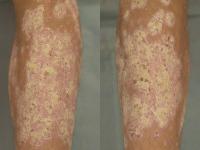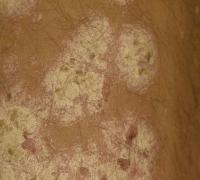Psoriasis

 Psoriasis is a recurrent inflammatory skin disease with strong family tendencies. This disease can occur at any age and is one of the most common skin ailments in dermatology. It is estimated that between 5 and 6 million Americans will be afflicted by psoriasis at some point in their lifetime. For many patients, there appears to be a direct relationship between increased stress and their psoriasis flare-ups.
Psoriasis is a recurrent inflammatory skin disease with strong family tendencies. This disease can occur at any age and is one of the most common skin ailments in dermatology. It is estimated that between 5 and 6 million Americans will be afflicted by psoriasis at some point in their lifetime. For many patients, there appears to be a direct relationship between increased stress and their psoriasis flare-ups.
Psoriasis often presents itself with large, red, dry, scaling plaques over the elbows, knees, and scalp. Itching may also be a problem, but is normally not severe. Mild cases may never have anything more extensive than the above symptoms. In fact, the condition may spontaneously improve or even disappear, especially in the summer months.
Other patients with psoriasis are not as fortunate. Occasionally, patients with psoriasis may only see effects on the palms of their hands or soles of their feet. These areas may have multiple small pustules and may be extremely resistant to therapy. In more severe cases, the condition can progress with many small plaques scattered about the body. Large areas of skin may be covered with plaques and, in rare instances, the entire surface of the skin can be involved.
Treatment of Psoriasis and PUVA Therapy

 Treatments for psoriasis have improved considerably over the last 30 years. The use of topical and intralesional corticosteroids represent the mainstay of therapy for mild cases of this disease. However, when involvement of the skin exceeds 10% of the total surface, topical therapy can become time consuming, expensive, and less practical. Fortunately, many types of effective systemic therapies are now more practical and ease the time constraints placed on the patient.
Treatments for psoriasis have improved considerably over the last 30 years. The use of topical and intralesional corticosteroids represent the mainstay of therapy for mild cases of this disease. However, when involvement of the skin exceeds 10% of the total surface, topical therapy can become time consuming, expensive, and less practical. Fortunately, many types of effective systemic therapies are now more practical and ease the time constraints placed on the patient.
One of the easiest forms of therapy for extensive psoriasis is UVB therapy. Ninety percent of patients receiving a series of treatments usually find relief from their disease. It is important to note, however, that this is not a cure. Maintenance therapy may be necessary to remain clear of psoriasis. As with all systemic therapy, UVB therapy is not perfect and there are no guarantees as to a specific patient’s response to treatment. Other forms of systemic therapy include the use of biologics, methotrexate, cyclosporin, retinoids, hydroxyurea, and many others. Please discuss the therapeutic options for psoriasis with your dermatologist.

